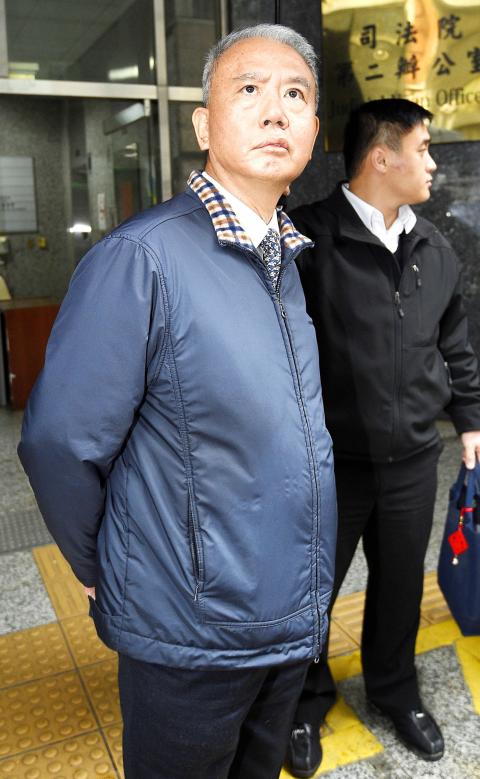Senior Ting Hsin International Group (頂新集團) executive Wei Ying-chun (魏應充) was found guilty of defrauding consumers and breaching food safety laws and given a four-year jail term by the Taipei District Court in a first-round ruling yesterday.
The court also ordered Wei Chuan Foods Corp (味全食品), a subsidiary of Ting Hsin, to pay a NT$15.5 million (US$473,051) fine, while Wei Chuan Foods general manager Chang Chiao-hua (張教華) was found not guilty.
Chang was the only one of 13 defendants to escape punishment, with 11 other company employees, excluding Wei, found guilty and sentenced to prison terms ranging from five months to 46 months, most of which can be commuted to fines.

Photo: Chen Chih-chu, Taipei Times
Wei’s lawyer Yu Ming-hsien (余明賢) said they would appeal his sentence.
“We regret this ruling and we cannot accept it... We believe Wei Chuan employees undertook their work by following the rules and did not break the law. We will appeal the ruling to fight for not-guilty rulings for Wei Chuan employees,” Yu said.
Legal professionals said Wei and his company got off lightly.
Lawyer Lin Chun-feng (林俊峰), a former prosecutor, said the court handed down light sentences to both Wei and Wei Chuan Foods for fraud and adulterating food products, which harmed people’s health.
Prosecution of the 2014 case involving tainted cooking oil was divided into two judicial cases, with yesterday’s ruling dealing with the firm’s plant-based oil products, while the Changhua District Court handled the case dealing with animal-based oil products.
The Changhua District Court’s not-guilty verdict handed down to Wei and five other defendants in November last year caused a public furor, while prosecutors have appealed that case to the Taiwan High Court.
Yesterday’s ruling said Wei Chuan Foods made illicit profits estimated at NT$209.73 million by mixing low-grade palm oil and other low-cost oils containing artificial coloring from supplier Chang Chi Foodstuff Factory Co (大統長基), and after processing, marketed the products as high-grade olive oil and other expensive cooking oils.
Among the four Wei brothers who owned and managed Ting Hsin Group, Wei Ying-chun is the main figure embroiled in the scandal, as he headed the group’s food and oil product subsidiaries, having served as chairman of Wei Chuan Foods, Ting Hsin Oil and Fat Industrial Co (頂新製油實業) and Cheng I Food Co (正義股份).
Wei and 11 other defendants were found guilty of fraud, faking product labels and breaches of the Act Governing Food Safety and Sanitation (食品安全衛生管理法), according to yesterday’s ruling.
Among them: former Ting Hsin Oil and Fat general manager Chang Mei-femg (常梅峰) was handed a 46-month term; Chung Mei-yu (鍾美玉), former head of Wei Chuan’s research center, was sentenced to 22 months; Shih Chieh-jen (施介人), manager of Wei Chuan’s food and oil product research and development division, was given 27 months; and Chen Jung-hui (陳榮輝), deputy head of the company’s product testing and analysis division, was senteced to five months.
Wei Chuan Foods said it regretted the Taipei District Court’s ruling against the company and its employees.
“We will immediately seek to appeal the ruling made by the court and will file a lawsuit against Ting Hsin Oil and Fat Industrial Co to seek compensation,” the company said in a statement.
Additional reporting by Aileen Chuang

CHAOS: Iranians took to the streets playing celebratory music after reports of Khamenei’s death on Saturday, while mourners also gathered in Tehran yesterday Iranian Supreme Leader Ayatollah Ali Khamenei was killed in a major attack on Iran launched by Israel and the US, throwing the future of the Islamic republic into doubt and raising the risk of regional instability. Iranian state television and the state-run IRNA news agency announced the 86-year-old’s death early yesterday. US President Donald Trump said it gave Iranians their “greatest chance” to “take back” their country. The announcements came after a joint US and Israeli aerial bombardment that targeted Iranian military and governmental sites. Trump said the “heavy and pinpoint bombing” would continue through the week or as long

TRUST: The KMT said it respected the US’ timing and considerations, and hoped it would continue to honor its commitments to helping Taiwan bolster its defenses and deterrence US President Donald Trump is delaying a multibillion-dollar arms sale to Taiwan to ensure his visit to Beijing is successful, a New York Times report said. The weapons sales package has stalled in the US Department of State, the report said, citing US officials it did not identify. The White House has told agencies not to push forward ahead of Trump’s meeting with Chinese President Xi Jinping (習近平), it said. The two last month held a phone call to discuss trade and geopolitical flashpoints ahead of the summit. Xi raised the Taiwan issue and urged the US to handle arms sales to

State-run CPC Corp, Taiwan (CPC, 台灣中油) yesterday said that it had confirmed on Saturday night with its liquefied natural gas (LNG) and crude oil suppliers that shipments are proceeding as scheduled and that domestic supplies remain unaffected. The CPC yesterday announced the gasoline and diesel prices will rise by NT$0.2 and NT$0.4 per liter, respectively, starting Monday, citing Middle East tensions and blizzards in the eastern United States. CPC also iterated it has been reducing the proportion of crude oil imports from the Middle East and diversifying its supply sources in the past few years in response to geopolitical risks, expanding

Pro-democracy media tycoon Jimmy Lai’s (黎智英) fraud conviction and prison sentence were yesterday overturned by a Hong Kong court, in a surprise legal decision that comes soon after Lai was jailed for 20 years on a separate national security charge. Judges Jeremy Poon (潘兆初), Anthea Pang (彭寶琴) and Derek Pang (彭偉昌) said in the judgement that they allowed the appeal from Lai, and another defendant in the case, to proceed, as a lower court judge had “erred.” “The Court of Appeal gave them leave to appeal against their conviction, allowed their appeals, quashed the convictions and set aside the sentences,” the judges